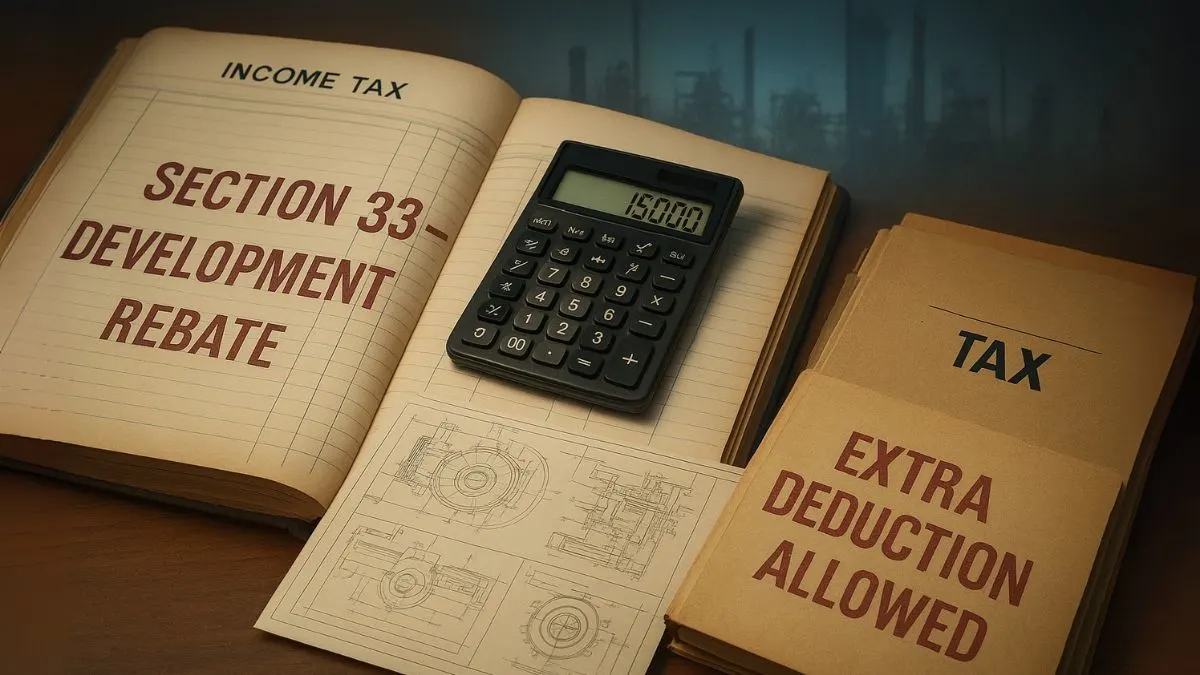
Tax laws in India are designed not only to collect revenue but also to incentivize certain economic activities. One such provision is Section 33 of Income Tax Act, which deals with Development Rebate and certain deductions related to tangible and intangible assets.
This section helps businesses by providing deductions against the amount set aside for site restoration & also encourages investment in new machinery, buildings, and equipment by offering rebates on development expenditure. In simple words, Section 33 reduces the taxable income of companies and professionals who put their money into infrastructure growth and asset creation.
What is Section 33 of Income Tax Act?
Section 33 essentially offers tax incentives in the form of Development Rebate. This rebate allows businesses to claim deductions for amounts they invest in plant, machinery, or other assets used for industrial purposes.
The provision also covers cases where businesses are required to set aside a portion of their income for site restoration (common in industries like mining, oil, and energy). Moreover, Section 33 provides for deduction in respect of tangible and intangible assets, thereby broadening its scope to cover modern businesses where intellectual property & intangible resources also matter.
Key Features of Section 33
- Development Rebate:
- A percentage of the cost of new plant or machinery can be claimed as rebate.
- Encourages businesses to invest in technology & capacity building.
- Deductions for Site Restoration:
- Some industries, like mining, are required by law to restore sites after use.
- Section 33 provides deductions against the amount set aside for site restoration, reducing the burden on companies.
- Tangible and Intangible Assets:
- It provides for deduction in respect of tangible and intangible assets, making it useful not only for manufacturing but also for businesses investing in patents, designs, or intellectual property.
- Industrial Growth Focus:
- Primarily designed to promote industrial growth, sustainability, and responsible resource utilization.
Also Read: Conditions for Depreciation and Development Rebate
Development Rebate: Meaning and Importance
The Development Rebate under Section 33 is one of the most significant aspects. It is essentially a tax benefit that allows a portion of the investment in plant and machinery to be deducted from taxable income.
Example:
If a company invests ₹50 lakhs in new machinery and the development rebate rate is 25%, it can claim a rebate of ₹12.5 lakhs. This reduces the company’s taxable income and promotes reinvestment."
By lowering tax liability, the rebate acts as an incentive for industries to modernize equipment, improve efficiency, and boost overall productivity.f
Site Restoration and Environmental Responsibility
A unique part of Section 33 is that it also provides deductions against the amount set aside for site restoration.
Industries like mining, quarrying, or oil extraction have environmental obligations to restore the site once operations are over. This requires large sums of money, which can otherwise be a burden. Section 33 ensures that such expenses are recognized for tax purposes, making it easier for companies to comply with environmental regulations.
Tangible and Intangible Assets Coverage
In today’s economy, assets are not just physical. Businesses rely heavily on intangible assets such as patents, copyrights, trademarks, and goodwill. Section 33 acknowledges this reality & provides for deduction in respect of tangible and intangible assets.
This inclusion makes the law more relevant to startups, IT companies, and knowledge-based industries that derive significant value from intellectual property.
Also Read: Taxation of Property Owned by Co-Owners
Conditions for Claiming Deductions under Section 33
To ensure the deductions are genuine, certain conditions apply:
- Assets must be owned by the taxpayer.
- They must be used for the purpose of business or profession.
- In the case of Development Rebate, reserves may need to be created in company accounts.
- For site restoration deductions, the liability must be backed by legal or contractual obligations.
Why Section 33 Matters for Businesses
- Encourages Investment: Helps companies reinvest in assets without worrying about heavy tax liability.
- Promotes Sustainability: By recognizing restoration costs, it enforces environmental responsibility.
- Supports Modern Economy: Extending benefits to intangible assets makes the provision relevant for IT & tech industries.
- Tax Planning Tool: Provides an effective way for businesses to optimize their tax liabilities.
Example of Practical Application
Let’s consider a mining company, XYZ Ltd.
- It invests ₹20 crores in new machinery.
- Under Section 33, it claims Development Rebate of ₹5 crores (assuming 25%).
- It also sets aside ₹2 crores for site restoration after mining operations.
- Additionally, it invests ₹1 crore in patents for technology used in the business.
All these expenditures qualify for deductions under Section 33, reducing the company’s taxable income significantly.
Challenges and Limitations
- The applicability is subject to detailed rules & conditions, which can be complex.
- Companies need proper documentation and reserves to claim rebates.
- Misinterpretation of "intangible assets" can sometimes lead to disputes with tax authorities.
Also Read: A Hidden Gem for Manufacturers & Industrial Growth
Judicial Interpretations
Courts have generally upheld the intent of Section 33 as being incentive-oriented. They have ruled in favor of businesses that can show genuine investments in development, restoration, or intangible assets."
Conclusion
Section 33 of Income Tax Act is a forward-looking provision that balances industrial growth with environmental responsibility. By allowing Development Rebate, acknowledging deductions against the amount set aside for site restoration, and covering tangible and intangible assets, it provides businesses with valuable tax relief.
👉 Want to make sure you’re claiming all the deductions you’re eligible for under Section 33? Get in touch with our tax experts at Callmyca.com — we’ll help you maximize your savings while staying 100% compliant.











